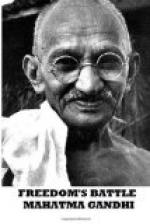THE ALTERNATIVE
Is violence or total surrender the only choice open to any people to whom Freedom or Justice is denied? Violence at a time when the whole world has learnt from bitter experience the futility of violence is unworthy of a country whose ancient people’s privilege, it was, to see this truth long ago.
Violence may rid a nation of its foreign masters but will only enslave it from inside. No nation can really be free which is at the mercy of its army and its military heroes. If a people rely for freedom on its soldiers, the soldiers will rule the country, not the people. Till the recent awakening of the workers of Europe, this was the only freedom which the powers of Europe really enjoyed. True freedom can exist only when those who produce, not those who destroy or know only to live on other’s labour, are the masters.
Even were violence the true road to freedom, is violence possible to a nation which has been emasculated and deprived of all weapons, and the whole world is hopelessly in advance of all our possibilities in the manufacture and the wielding of weapons of destruction.
Submission or withdrawal of co-operation is the real and only alternative before India. Submission to injustice puts on the tempting garb of peace and, gradual progress, but there is no surer way to death than submission to wrong.
THE FIFTH UPAYA
Our ancients classified the arts of conquest into four well-known Upayas. Sama, Dana, Uheda, and Danda. A fifth Upuya was recognised sometimes by our ancients, which they called Upeshka. It is this Punchamopaya that is placed by Mahatma Gandhi before the people of India in the form of Non-cooperation as an alternative, besides violence, to surrender.
Where in any case negotiations have failed and the enemy is neither corruptible nor incapable of being divided, and a resort to violence has failed or would certainly be futile the method of Upeshka remains to be applied to the case. Indeed, when the very existence of the power we seek to defeat really depends on our continuous co-operation with it, and where our Upeskha its very life, our Upeskha or non-co-operation is the most natural and most effective expedient that we can employ to bend it to our will.




